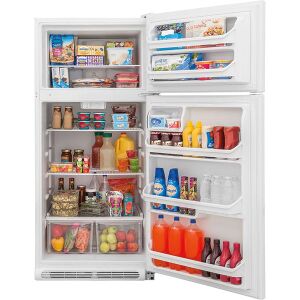Refrigerator

A refrigerator is a kitchen appliance to keep easily perishable food cold. Generally, refrigerators are for storing food for a short length of time while freezers, canning, and dehydration are used to store food for long lengths of time. To prevent food from spoiling or freezing, a thermostat is used to keep the food between 32-40°F (0-4°C).
Conventional refrigerators use a large amount of electricity but more efficient alternatives exist.
| Type | Price | Storage (ft³) | Watts / Day | Watts / Day / ft³ |
|---|---|---|---|---|
| Conventional | $478.00 | 18 | 1106 | 61.4 |
| Solar Powered | $852.00 | 6 | 520 | 86.6 |
| Chest Refrigerator† | $328.00 | 10.6 | ≤596.85† | ≤56.3† |
| Zeer pot | Various | Various | 0 | 0 |
† A chest freezer can be converted to a very efficient chest refrigerator which will use less electricity than running as a freezer. These numbers are based off the machine running as a freezer so actual usage will be less.
Chest refrigerator
A chest freezer converted to a chest refrigerator is a very efficient, inexpensive, a low energy alternative to a conventional refrigerator. While it uses more electricity than a zeer pot, a chest refrigerator may be easier to integrate into a modern household, although it may not be ideal for aging in place considerations.
A chest refrigerator can be integrated into the kitchen as additional counter space or as a kitchen island. However, prolong heavy or uneven weight on top of the chest refrigerator can warp the door's seal overtime and create an increase of humidity inside the refrigerator while also causing the compressor to run more often. Care should also be taken to allow proper clearance along the sides of the appliance to allow for heat to properly escape.[1] Contact paper or special paint[2] can help incorporate a chest refrigerator into a kitchen.
